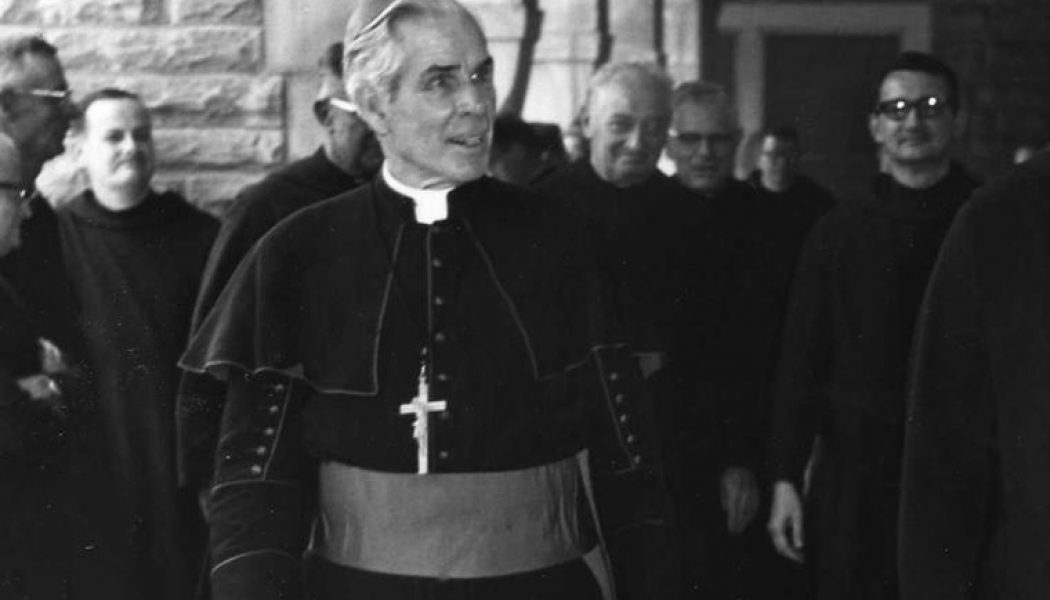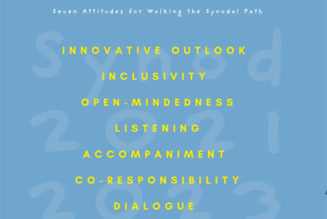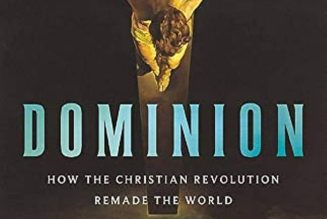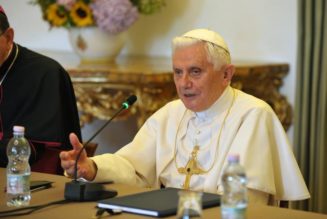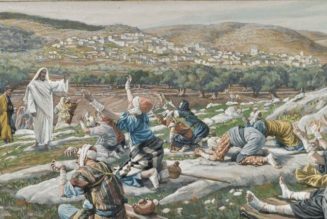
During one of his radio talks in 1943 on his series “Crisis in Christendom,” Archbishop Fulton Sheen saw not only what was happening in his times, but was prophetic about our times. He warned that “the beginnings of a new era are often marked by a general barbarization, when the whole historical order is dissolved … when Truth in some nations is nailed to a Cross, and in others rejected in a stroke of false broadmindedness.”
The same year, in Philosophies at War, he referred to the Rome’s decline. “The difference between that crisis and ours is that in the case of Rome a material civilization was collapsing and a spiritual about to emerge,” Sheen explained. “In the present instance, it is the spiritual which is being submerged and the material which is in the ascendency.”
What’s more, Sheen added, “Our so-called liberal civilization, which is dying, is only a transitional phase between a civilization that once was Christian and one that is anti-Christian. It has no stability of its own, being based for the most part in successive negations of the Christian philosophy of life. … This alone constitutes the crisis of democracy; it will either return to its roots or die.”
The picture he painted harked back to the major Old Testament prophets admonishing Israel when it was galloping into various idolatries toward imminent ruin.
But Sheen didn’t leave out a critical component when he also firmly said that “we are not without hope in this hour of calamity — for only those who walk in darkness ever see the stars.”
Warning again in 1947 in Way to Happiness that “our exterior world today is in desperate straits,” Sheen continued, “but the inner world of man is far from hopeless. … The world is far from God, but human hearts are not. That is why peace will come less from political changes than from man himself, who, driven to take refuge within his own soul from the turmoil without.”
He saw the time “not far off when modern men will utter a frantic appeal to God to lift them from the empty cistern of their own egos.” If they stay in the cistern, nothing but gloom surrounds them. “The world is full of prophets of gloom, and I would be one of them if I did not practically believe in God,” he said. “This attitude of pessimism varies in direct ratio and proportion to the frequency with which one follows world news. … As a result, people lead political lives, not spiritual lives.”
How right he was today in this regard. He said, “Tremendous disproportions are created by headlines and news reports, as too often the startling is identified with the true. Parents who live in love and affection for one another, and rear their children for the triple piety of God, neighbor, and country make no headlines.”
During his early 1940s radio talks Sheen also foresaw that “the day we adopt in our democracy the already widespread ideas of some American jurists that right and justice depend on convention and the spirit of the times, we shall write the death warrant of our independence … and when we deny God as the foundation of our rights, we shall no longer have rights.”
Looking Ahead at Our Age
“Why are all these social experiments failing and why is America at the threshold of its own implosion? I believe the American prophet for our times, Fulton Sheen provides the answer back in the early 1940s,” says Sheen expert Peter Howard, founder and president of the Fulton Sheen Institute. “We ignored the prophetic voice of Sheen at our peril back in the 20th century. Now we are face to face with all that he warned us about.”
He quotes Sheen from the bishop’s Philosophies at War:
“The means of life no longer minister to peace and order because we have perverted and forgotten the true ends of life. … Now the basic reason why our economics and politics have failed as a means to peace is that both have forgotten the end and purpose of life. We have been living as if civilization, culture and peace were by-products of economic activity, instead of the other way round, so that economics and politics are subordinated to the moral and the spiritual. … We live and act as if God had never made us.”
The topsy-turvy daily news and headlines and philosophies became roadmaps taking us away from that one narrow road that Christ pointed out — a road that Sheen, like the prophets of old, tried to steer us toward again.
“Instead of this being a time of disaster, it is rather a period of humiliation,” Sheen said. “We are being left to ourselves, to our own devices, to our own conceits.”
Reflecting on the prophetic Sheen, Howard points out the rapid scientific advancements made “since the world make a conscious decision to reject God and absolutize the human intellect as the source of enlightenment. Where has that path taken us? Not to love, not to life, not to peace, not to freedom. It has taken us to the complete opposite and the world is now just beginning to wake up to this frightening reality.”
No one is immune. Sheen said, “It makes no difference how wicked a soul may be, there is no one subjecting himself to illicit pleasures who does not have a consciousness of his subjection and his slavery.”
Yet in Way to Happiness he saw that “this is not the end of civilization; nor are we to be without hope. We have simply reached a moment in history where God is permitting us to feel our inadequacy, so long as we trust only in ourselves.”
Bishop Sheen believed we are “living on the eve of one of the great spiritual revivals of human history. Souls are sometimes closest to God when they feel themselves farthest away from Him, at the of despair. For an empty soul, the Divine can fill; a worried soul, the Infinite can pacify. A self-concerned, proud soul, however, is inaccessible to Grace.” But as best wheat bows its grain-filled head, so “In national life, as in nature, humility, with a head bowed before God, is the beginning of greatness.”
In the late 1940s, Sheen spoke as if foreseeing today when he said, “Modern man has been humiliated: neither his proud expectations of progress nor of science have turned out as he hoped. Yet he has not quite reached the point of humbling himself. He is still imprisoned in the self, and able to see nothing else beyond.” Yet he added, “but the time is not far off when modern men will utter a frantic appeal to God to lift them from the empty cistern of their own egos.”
Howard says we must wake up and turn to God, as the first great commandment tells us to — with all our heart, mind and strength. Sheen stressed “the war we are in is not between political parties or economic philosophies. Our problems are theological. It is a war between good and evil and that war has entered its final hour.”
Sheen foresaw our times and presaged: “Unless there is a moral revival in our Western world (especially) and a rebirth of family life, Communism may be the instrument for the liquidation of a bourgeois civilization that has forgotten God.”
In Communism and the Conscience of the West (1948) Venerable Sheen made it clear that “Communism is both an effect and a judgment on our Western world; an effect because it was born of our unfulfilled Christian duties, our abandonment of the Father’s House in favor of materialism; a judgment because it reveals how wrong has been our thinking, how evil have been our deeds.”
Taking these very words of Sheen’s, Servant of God John Hardon said, “We must humbly acknowledge our guilt before God, sincerely repent, and do penance for the errors of the past. But even this is not enough,” because as Sheen said, “unless there is a moral revival in our Western world a rebirth of family life, Communism may be the instrument for the liquidation of a bourgeois civilization that has forgotten God.”
Noting what Sheen prophesied, Howard, whose online “The Final Hour” is about Sheen’s foresight and plan to save America, comments that we have to begin “to rebuild this collapsing world order with the foundation of humility and do so one family at a time. It all starts with the family.”
It has to. “The educated know how to rationalize evil,” Sheen said in his early 1940s radio talks. “And in saying this I am only repeating in poor language the eternally beautiful thought of the Savior: ‘I confess thee, O Father, Lord of heaven and earth, because thou hast hidden these things from the wise and prudent and hast revealed them to little ones’ (Luke 10:21).”
Hope Is the Anchor
Sheen foresaw:
“Our greatest days are ahead, though in between intervenes the purging, where we will learn that as the rays cannot survive without the sun, so neither can we prosper without God. This hope can be translated into victory in either of two ways: by prayerful remaking our hearts, or by being brought within an inch of disaster, until from the depths of our insufficiency we cry out to the Goodness of God.”
Which will it be? One way or the other, purification from the culture of death will be necessary.
As he observed, “The educated know how to rationalize evil.”
“I can see no hope,” Sheen told his radio listeners, “unless we reverse the present order and admit that instead of politics setting limits to religion and the morality of Jesus Christ, religion and the morality of Jesus Christ must begin to set limits to politics.”
And again, that “unless America restores religion and morality and discipline under God, it will avail us naught to arm ourselves against the enemy from without.”
But, of course, Sheen was not one to lose hope and he prompted us to hold fast to it in the most calamitous of times. Talking on Easter Sunday, April 13, 1941, in the face of the dire world situation with Pearl Harbor only months away, Sheen spoke about hope: “Hope that we may not share the defeatism of those, who because they have forgotten their God, have lost the hope of resurrection.”
“The first lesson is this: Moments of great catastrophe are often the eves of great spiritual renaissance,” he said. “Our Divine Lord Himself, speaking of wars, rumors of wars, earthquakes, and distress of nations, made the forecast of these calamities the very motive of hope: ‘But when these things begin to come to pass, look up and lift up your heads, because your redemption is at hand’ (Luke 21:28).”
“The reason moments of catastrophe may be the eves of spiritual victory is because it is in those moments of defeat that man’s pride is most humbled and his soul thus prepared for the help of God.” Prophet Sheen pointed to the Prodigal Son.
Sheen showed the hope he accentuated was not the wishful thinking variety but the genuine and necessary virtue. “We are hopeful not because this is a good world, for presently it is not,” he said. “Our trust is not in the inherent natural goodness of man, but in the powers of God who can raise him from the dead … Our optimism is based not on ‘progress,’ but on its breakdown. Our modern pagans despair when they become disillusioned about the world. We hope, and when we begin to be disillusioned about ourselves; and therein is the pathway to repentance and to God.”
But “suffering and war and evil can be faced without losing hope either in humanity or in God” if we look to “the vision of Calvary” and what happened there.
While those living “only on the husks of materialism” voice despair, “thanks to Christ in His Vicar, we live in the hope of a better day, even in an hour that is dark and black, for Easter Sunday was not within three days of the Transfiguration, it was within three days of Good Friday.”
“That is why we who believe in Easter and the victory of spirit over matter will not be without hope for America,” he concluded, “so long as it trusts in God.”
Join Our Telegram Group : Salvation & Prosperity
